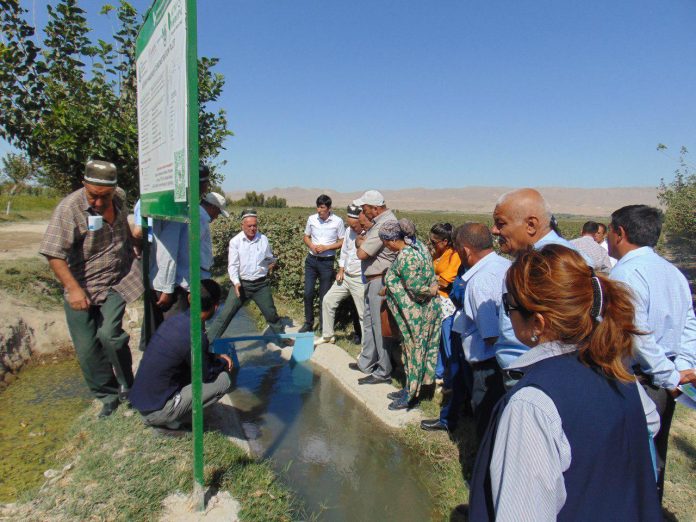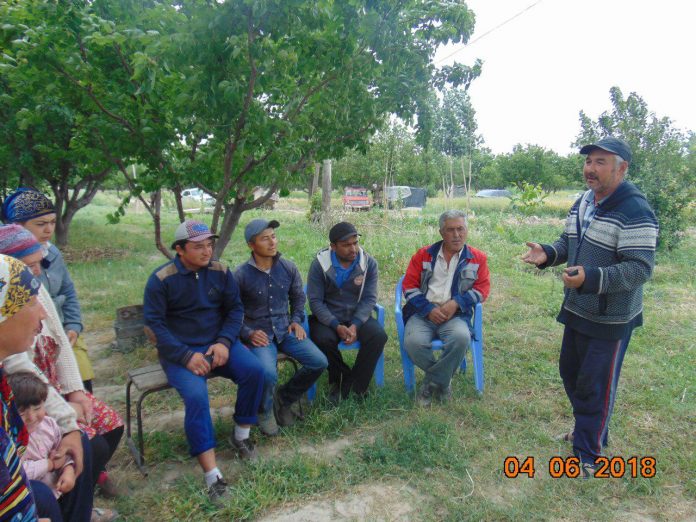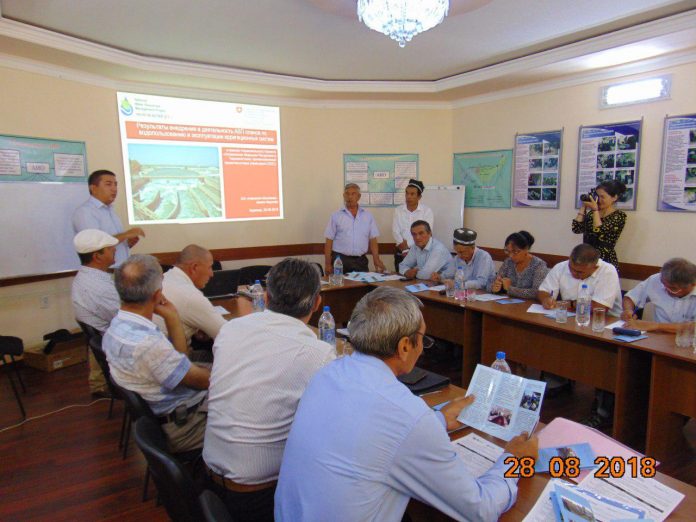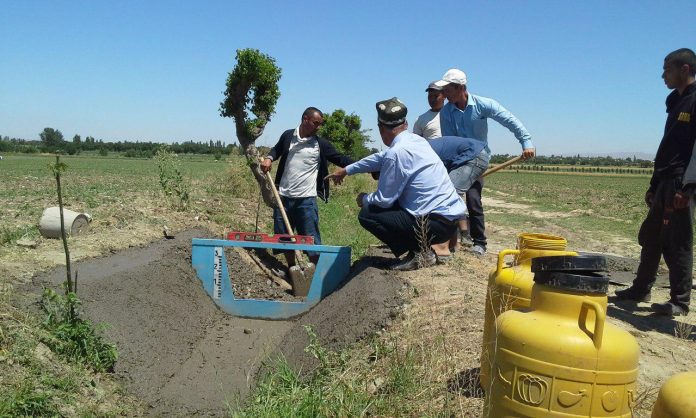Almost three decades have passed since Tajikistan became independent. The same amount of time has passed since the first collective farm system collapsed. The agricultural world in all developed countries has moved far ahead. However, some Tajik farmers are still afraid of innovations in this system and refuse to introduce an y innovations on their land. The reason for such anattitude may be that Tajik farmers have been accustomed to a single work regime for decades. The innovations of the 21st century, in their opinion, will lead the farm to losses.
Three years ago, no one could convince Abdusamad Abduvohidov, a famous farmer from Bobojon Ghafurov district, to introduce new mechanisms for growing fruits and vegetables on his land. Or to introduce new systems of land irrigation. He is the chairman of the Bogparvar Water Users Association (hereafter WUA). Maintaining conservative attitudes, Abdusamad was critical of any innovations.
When specialists of Neksigol Mushovir came to me and told me about the new project, about the introduction of a new irrigation system, I had my doubts. I looked at them dryly. Today, when I think back on my thoughts that I had during the first meeting, I am both amused and ashamed. In fact, Neksigol Mushovir has awakened us from a deep sleep!» — says Abdusamad Abduvokhidov.
*** *** ***
In 2016, Neksigol Mushovir within the «National Water Management Project» started to implement this project activities in Sughd Region. The project activities were aimed at strengthening water conservation management. The main goal was:
- establishment of Field Farmer Schools (FFS)
- introducing simple and affordable technologies for water saving
- dissemination of knowledge and methods for productive water use
- introducing drip irrigation system
- short furrow irrigation
- tubular irrigation
- mulching — covering the top layer of soil with black film

The National Water Management Project was implemented by a consortium of international organizations HELVETAS Swiss Intercooperation, GIZ and ACTED, which was financed by the SDC. From the beginning of the first phase of the project in 2016, Neksigol Mushovir carried out specific project activities in the territory of Sughd region.
During this period, the organization implemented several components on the projects, and the establishment of Field Farmer Schools is one of them.
As Akmal Nasrulloev, a specialist of the organization, noted, the farmlands in the districts of B. Ghafurov and J. Rasulov are irrigated with water from the Khojabakirgan sai. And some lands in Spitamen district are irrigated from Oksu sai. «While conducting analyses, our experts have identified the following problems:
- Wear and failure of irrigation structures
- Concrete deterioration of canals, which caused water loss during irrigation
- Clay and sludge clogging of canals and streams of farms
- Worn out water pipes
- Lack of tools and equipment for water delivery and measurement
- Low level of knowledge and skills of water users
The activities of the project were aimed at solving these problems, and as far as possible we achieved significant results» – said Akmal Nasrulloev.
*** *** ***
After the restructuring of the agricultural sector, land was distributed to different layers of society. That is, both teacher, doctor, and businessman, who did not have enough basic knowledge of farming, resorted to agriculture. Neksigol Mushovir set up demonstration plots in 29 WUAs and trained 29 trainers for FFSs. Trainers conducted trainings for farmers on modern methods of irrigation, irrigation regimes, methods of improving soil fertility, etc. Water-saving technologies and water measurement tools were installed on demo plots to show the effectiveness of new technologies in the fruitful use of water.
«Water is the lifeblood of the earth. And Mirobs are the people who regulate the flow of that blood. If there is anemia in the body, one faces various diseases. If there is a lot of blood, so too. The task of water in the earth is the same. The Mirob regulates the distribution of water to the farmers at the right time, in the right quantity, and according to the turn. He also helps in setting up and counting the amount of water used. If there is no Hydrotechnician and Mirob, proper water distribution will be disturbed and perhaps farmers will deal with each other by throwing hoes. It would be good if every new farm that is created today cooperated with Hydrotechnicians and Mirobs in addition to agronomists. These are two very important professions in agriculture» — says the specialist of Neksigol Mushovir”.
*** *** ***
Our hero, Abdusamad Abduvokhidov, chairman of WUA «Bogparvar» from Bobojon Ghafurov district, works as a trainer of FFS in this project. In the WUA «Bogparvar», in which 56 members work in 563 hectares of land, organized several demonstration plots. In one of these plots, short furrow irrigation was conducted on an area of 1 hectare. This method, too, helps fruitful use of water. «The furrows of our cotton lands are very long. If we launched water at the beginning of the furrow, it didn’t reach the end. This was the reason for the loss of the cotton crop. After introducing irrigation in short furrows, the cotton got the water it needed at a certain time,» — says Abdusamad.

A drip irrigation system was installed for the young trees. «The pipes of the canal irrigated by machine had long since worn out. The trees were in a drought stage. It was project assistance that gave the trees a second life. In addition, we dug up a pond. If we had implemented this technology with our own resources, we would have spent at least five thousand TJS on 0,10 ha of land. To raise that much money, we would have gone through dozens of arguments and disagreements and emotional stress. We saved not only money, but also time and nerves…. And we saw how drip irrigation can help us on land with irrigation challenges. I am very glad to cooperate with Neksigol Mushovir » — added Abdusamad.
Within the framework of the National Water Management Project the organization provided advice and increased the knowledge and skills of the target farmers. According to the results of the two-year activity, one of the achievements of the project is that the farmers were able to count the amount of water used after the installation of water measuring devices and practical studies. And also, they were able to determine the duration of irrigation and the volume of water with the help of soil moisture meters. The technology to save water, which was presented by the project on the part of Neksigol Mushovir, eased the costs of the farmers by up to 20%.

«I recommend cooperating with this organization to anyone who wants to farm,» —says Abdusamad Abduvohidov. «They have no useless advice. In the beginning it seems ridiculous, but afterwards you regret meeting them too late. How will you work? Will you benefit from the work or suffer losses, you know? The experts at Neksigol Mushovir will teach you all that. Now I even agree to introduce some things at my own expense» — added the experienced farmers.
Increased crop yields and access to water conservation in every area is a good result not only for the National Water Management Project but also for the whole country. Neksigol Mushovir conducts all its activities in cooperation with representatives of local and state agencies, provincial departments of the Ministry of Agriculture. Today, 29 demonstration plots are entrusted to the farmers themselves. Farmers can always get advice from trainers on water saving technologies and ways to measure water using water meters. The sustainability of the project also involves the training of specialists and local personnel, Mirobs, Hydrotechnicians and special trainers in three districts and 29 WUAs who are ready to serve the farmers of their region daily.
For information:
The Government of Tajikistan, in cooperation with development partners, has launched 17 state water investment projects worth 2.4 billion TJS. To date, 50% of them have already been implemented. Separately, 35 projects worth 5.4 billion TJS are being implemented in the sphere of agriculture and land irrigation.
Khosiyat Komilova





